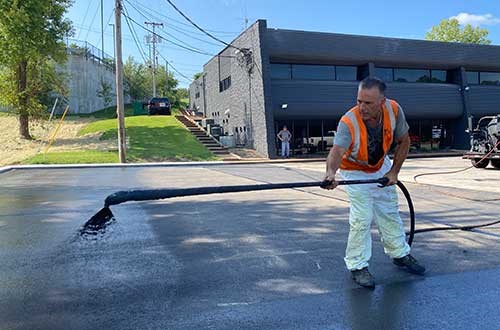Introduction
Asphalt driveways are a popular choice for both residential and commercial properties due to their durability and cost-effectiveness. However, over time, these surfaces can deteriorate, leading to unsightly cracks, potholes, and tire marks. This is where seal coating comes in.
If you’re not sure when to seal a new asphalt driveway, it’s best to wait at least 6 months after installation. During this time, the asphalt is still curing and can be vulnerable to damage. Waiting until the surface has fully dry or cured will ensure that the seal coat adheres correctly, providing maximum protection.
The Importance of Sealing an Asphalt Driveway
The importance of sealing an asphalt driveway can’t be overstated. Not only does it protect the surface from oxidation, but it also helps prevent severe damage that can be so costly in the future.
Asphalt driveways are exposed to a wide range of environmental factors such as sunlight, rain, and snow. These elements can cause the asphalt to weaken and break down, leading to cracks, potholes, and other forms of damage. Sealing the driveway creates a barrier between the surface and the elements, preventing them from penetrating and causing damage.
Aside from the protective benefits, sealing your driveway also enhances its appearance. A freshly sealed driveway looks clean and new, adding curb appeal to your property. This can be especially beneficial if you’re planning on selling your home, as a well-maintained driveway can help increase its value.
Sealing your driveway can save you a lot of money on repairs. By protecting the finish from damage, you can avoid the expensive repairs that may arise from neglecting maintenance. Investing in regular maintenance can extend the lifespan of your driveway.
When to Seal a New Asphalt Driveway
A. Waiting Period after Installation
It is recommended that you wait at least six months after installing a new asphalt driveway before sealing it. This allows the asphalt to fully cure and harden, ensuring that the sealant will adhere properly.
Factors that can affect the waiting time include the thickness of the asphalt and weather conditions.
B. Temperature Considerations
Ideal air and surface temperatures for sealing a driveway are between 50-80 degrees Fahrenheit. If the temperature is too cold, the sealant will not cure properly, and if it is too hot, it will dry too quickly, resulting in an uneven finish.
It is best to seal your driveway on a warm summer day when the air temperature is optimal.
C. Weather Conditions
Weather conditions can also affect the sealing process. It is best to avoid sealing your driveway in freezing weather, as the water in the sealant can freeze and cause premature cracking.
Weather permitting, it is best to seal your driveway on a clear and dry day. Weather permitting, it is best to seal your driveway on a warm summer day when the air temperature is above 50 degrees Fahrenheit.
This allows the sealant to dry and cure properly. Before sealing, it is important to clean the entire driveway using a pressure washer to remove any dirt, debris, or stains that could prevent the seal coat from adhering properly.
D. Surface Preparation
Before sealing your driveway, it is important to properly clean and prepare the surface. Use a pressure washer to remove any debris, dirt, or oil stains. Any cracks or larger issues should be repaired before applying the sealant.
If you seal your driveway too soon, before it is fully cured, it may result in premature cracking and other damage. Once the asphalt has fully cured, regular maintenance and seal coating can help prevent future damage and extend the life of your driveway.
If your driveway has larger cracks, it is best to repair them before sealing. While seal coating can help prevent future damage, it is not a substitute for repairing existing damage.
How to Seal a New Asphalt Driveway
A. Choosing the Right Sealer
There are different types of sealers available, including asphalt emulsion, coal tar, and acrylic. Choosing the right sealer for your asphalt driveway or parking lot can be a daunting task, but it’s crucial for the longevity and appearance of your asphalt surface. With various types of sealers available in the market, it’s essential to understand the differences and factors to consider when making your selection.
One of the primary considerations is the amount of traffic your asphalt surface receives. If you have a high-traffic area, such as a busy parking lot, you may want to opt for a more durable sealer, such as coal tar. Coal tar sealer is known for its ability to withstand heavy traffic and prevent damage from oil and gasoline spills.
Another factor to consider is the climate in which you live. If you live in an area with harsh winters, you’ll want a sealer that can withstand freezing temperatures and resist cracking due to temperature fluctuations. In this case, an asphalt emulsion sealer would be an excellent choice as it is designed to be more flexible and adapt to changing weather conditions.
B. Application Process
When it comes to sealing your driveway, it’s important to follow the right application process to ensure the best results. This will help protect your asphalt surface from damage caused by the elements and heavy traffic, while also improving its overall appearance.
Before you begin, you’ll need to gather the necessary tools and equipment. These include a sealer brush, squeegee, and sprayer. Depending on the size of your driveway, you may also need a power washer, a broom, and a bucket.
The first step in the application process is to clean and prepare the surface. This involves removing any debris, dirt, or stains using a power washer or a broom. If there are any oil or grease stains, it’s important to use a degreaser to ensure that the surface is completely clean and free of any contaminants. After cleaning, allow the surface to dry completely.
Once the surface is dry, you can begin the application process. It’s important to note that the temperature should be above 50 degrees Fahrenheit for at least 24 hours before and after the application process to ensure the sealant sets properly.
Using a sprayer, apply the sealant in thin layers, making sure to cover the entire surface. Avoid applying the sealer too thickly, as this can lead to cracking and peeling. Use a squeegee or sealer brush to spread the sealer evenly, making sure to cover any cracks or imperfections. Allow the first coat to dry completely before applying a second coat.
After applying the second coat, allow the surface to dry for at least 24 hours before using it. It’s important to avoid driving or walking on the surface until it’s completely dry. The drying time may vary depending on the type of sealer you’ve chosen and the weather conditions in your area.
C. Maintenance Tips
Maintaining your newly sealed driveway is essential to ensure that it remains in good condition and continues to look great for years to come. Here are some tips to help you keep your driveway in excellent shape:
Firstly, avoid parking heavy vehicles in the same spot repeatedly, as this can cause tire marks on the surface. These marks can be difficult to remove and may require additional maintenance. To avoid this, try to park your vehicles in different spots on your driveway.
Regular cleaning is also crucial to maintain your driveway’s appearance and condition. Sweeping the surface regularly can help prevent the buildup of dirt, debris, and leaves. If there are any oil or grease stains, it’s important to clean them immediately with a degreaser. Regular cleaning can help prevent the formation of cracks and potholes, which can lead to more significant damage in the future.
In case cracks do appear, it’s important to fill them as soon as possible to prevent further damage. Use a crack filler to repair small cracks and potholes before they become more significant issues.
Conclusion
Sealing your driveway is an important step in protecting your asphalt surface and preventing future damage.
We recommend that you wait at least six months after installation before sealing a new driveway, and that you ensure the surface is properly cleaned and prepared before applying the sealant.
Regular maintenance, such as filling in cracks and cleaning the surface, can help extend the life of your driveway or parking lot. By taking these steps, you can enjoy a smooth and durable surface that will last for years to come.
In summary, if you have a new driveway or parking lot, it is important to ensure that it has been properly installed and allowed to fully cure before sealing. Once it has cured, seal coating can be an effective way to protect your asphalt surface and prevent future damage.
Regular maintenance and repairs are also important for the longevity of your driveway. If you are unsure whether or not to seal your driveway, it is recommended that you wait until it has fully cured before making a decision. One of the areas we service is Westmoreland, TN. If you are in Westmoreland and in need of asphalt sealing services, please reach out!

